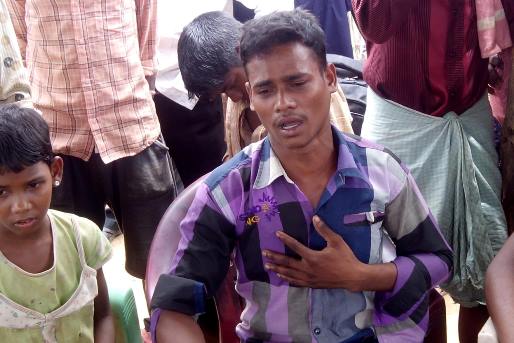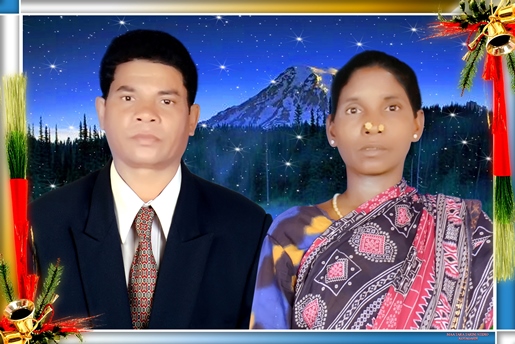
Update 6 Jan. 2017:
The Human Rights Commission of the eastern Indian state of Odisha has ordered the state government to pay one million rupees (US$14,720) in compensation to the six children of a Baptist couple shot dead allegedly by a federal paramilitary force in July 2015.
Dhubaleswar Nayak, 50, and his wife Bhubudi, 45, came under fire after climbing to the top of a hill in the Kotagarh area of Kandhamal district, to get mobile phone reception to call their sons after they had attended a church service.
Local Christians and human rights activists had asserted that the couple were killed by members of the Central Reserve Police Force engaged in an anti-Maoist operation. Security forces claimed that the couple were Maoists who had been “killed in encounter”, which would have suggested they had posed a threat. Christians and human rights activists said at the time that the security forces covertly took away the bodies and only returned them to relatives two days after local Christians and others blocked roads in protest.
“Whether they fell to bullets of suspected Maoists, or jawans [soldiers], the fact remains that two innocent tribal persons lost their lives by sustaining bullet injuries,” said Justice BK Mishra, while ordering the state to pay compensation to the dependants of the Baptist couple.
Responding to the commission’s ruling, the couple’s eldest son, Rahul, told World Watch Monitor: “We are relieved now.” Rahul, who quit his migrant job in Kerala following the tragedy to return home to look after his two brothers and three sisters, added: “Our parents were not Maoists. They were innocent people.”
Narendra Mohanty, Convener of the Campaign Against Fabricated Cases, which collected evidence and presented it to the Human Rights Commission, described the ruling as “a victory for the civil rights movement”. However, he said compensation alone was not enough, and demanded murder charges be brought against the paramilitary police officials involved in the shooting.
The sum awarded falls short of the amount demanded by a fact-finding team in 2015 who recommended five million rupees (US$ 76,500) should be paid to the couple’s children.
Original article (20 Aug. 2015):
Human rights groups claim a Christian couple were shot dead by Indian federal security forces last month, while they were speaking on the phone to their son on a mountain in the eastern state of Odisha – formerly known as Orissa.
The alleged murder of Dhubaleswar (50) and Bhubudi (45) Nayak took place in the Kandhamal district, infamous as the scene of the worst persecution of Christians in India’s history.
Exactly seven years ago, in August 2008, scores of Christians were killed by Hindu mobs demanding they convert or be killed. Three hundred churches and 6,000 Christian homes were looted and burnt down, rendering 56,000 Christians homeless.
Since then, the local Christian community has struggled to receive adequate compensation from the government, which has been a source of much contention. In June 2103, for instance, according to The Hindu, a report recommended that the Odisha State government “take immediate measures to adequately rehabilitate and resettle the victim-survivors of the Kandhamal violence”.
The report further urged the government to “ensure full reparation to those whose livelihoods were affected due to violence and strife”.
Father Ajaya Kumar Singh, director of the Odisha Forum for Social Action told Asia News: “This is a predominantly Christian village. After the violence of 2008, young people migrated to other states in search of work. Often people have to go to the top of the hill to get a signal and call the world. Dhubaleswar and his wife were ordinary Christians, not Maoist militants.”
“I could hear my mother shrieking and protesting as if somebody was trying to [rape] her. My father was also shouting. Then I heard gunshots and the last words of my father: ‘I am dying’.”
Rahul Nayak
On 17 August, World Watch Monitor spoke to Rahul Nayak, 25, the couple’s eldest son, who recalled his dreadful final conversation with his parents on 26 July.
“I could hear my mother shrieking and protesting as if somebody was trying to [rape] her. My father was also shouting. Then I heard gunshots and the last words of my father: ‘I am dying’. Afterwards, there was no response from the phone and soon it was switched off. It was a murder,” he said.
That day, Dhubaleswar and Bhubudi Nayak had attended the local Baptist church in Pangalpadar village – 350 km southwest of Odisha’s capital, Bhubaneswar – and then climbed a nearby mountain so they could speak with Rahul and his two younger brothers, Saul, 19, and Paul, 16, who is studying in a missionary school in Hyderabad.
“Every Sunday afternoon, I used to wait for their call, when they would come up on the mountain to speak to me, as our village has no mobile connectivity,” explained Rahul, who had been speaking to them from his workplace in Thrissur in the southern state of Kerala.
An hour later, he received a call from one of the villagers who had been with his parents, telling him they feared his parents had been killed. Immediately, Rahul rushed to the railway station to catch the next train home.

A fact-finding team comprised of half a dozen social action groups spoke with three Christians who had accompanied the couple on their walk – Sukant Chalanseth, Binsewar Chalanseth and Philimina Chalanseth – to stitch together an account of what happened.
The team’s 12 August report said the three Christians were climbing down the mountain at around 4pm, after speaking with their children, when they were stopped by officers of India’s largest paramilitary force, the Central Reserve Police Force (CRPF), who were patrolling for Maoist rebels. They pointed their guns at the group and questioned them. The Christians also told the officers that the Nayaks were on the mountaintop, making calls to their children.
An hour after their return to the village, the three heard gunshots from the mountain and told the other villagers about their own run-in with the CRPF, but “did not dare” to go back up the mountain that night, the report states.
Early the next morning, the villagers retraced their steps and found bloodstains and Dhubaleswar Nayak’s slippers, but no sign of the couple. Presuming that the couple had been killed and that the security forces had hidden the bodies, the villagers then rushed to the local Tumudibandha police station and demanded that a murder case be registered and the couple’s bodies handed over. However, the report claims the officer in charge refused, stating that only “higher authorities” could sanction such action.
“This is a coldblooded murder. When the couple resisted [a] rape attempt by the security forces, they shot them dead.”
–Narendra Mohanty, Campaign Against Fabricated Cases
Soon, hundreds of angry villagers – many of them Christians – crowded around the police station, demanding to see the dead bodies. They blocked roads and forced shops to close until, on the evening of 28 July, the couple’s bodies were handed over by top officials in Phulbani – the headquarters of Kandhamal district – 160km from Pangalpadar.
“The dead bodies were fully coated with soil and mud. [The police] may [have] buried the dead bodies. But when the mass protest rose, they [brought them out] for post-mortem and handed [them] over to the family,” the report states.
“This is a coldblooded murder,” Narendra Mohanty, state convener of the Campaign Against Fabricated Cases (one of the groups involved in the fact-finding team), told World Watch Monitor. “When the couple resisted [a] rape attempt by the security forces, they shot them dead. It is clearly mentioned in our report. “The local people could have easily identified the body. But it was not shown to them and but taken away from the spot… All these point to the same [thing].”
On 10 August, the couple’s sons filed a complaint with the Human Rights Commission of Odisha, as a 27 July text message sent to journalists from Kandhamal’s Superintendent of Police Kanwar Vishal Singh’s mobile phone seemed to claim the couple’s death was the result of an encounter between Maoist rebels and security forces.
“As per latest info by team … 2 unidentified dead bodies, few weapons, and other equipments/things have been found during search early in the morning by the team. More forces have been rushed to the spot for further search and cordon. More details are awaited. Please call for any further info,” said the message.
Singh then organised a press conference that day, in which he denied “the killing of two people by police firing”.
The fact-finding team’s report claims Singh “tried to give different colour and tried to change the mindset of the people by organizing a press conference … telling the success story of [the] operation by the forces against ultra-left extremists for which they destroyed Maoist camps, seized heavy arms & armoury”.
The Human Rights Commission in its response has asked the Odisha government to conduct two separate probes – one by an additional DG (state-level director general of police) and the other by a revenue divisional commissioner – into the alleged murder of the couple by police in Kandhamal, under the cover of anti-Maoist operations, as reported in The Indian Express.
The fact finding team has demanded that the guilty officials be tried for “murder”, that compensation of five million rupees (US$ 76,500) be paid to the couple’s six children, and that the government offer employment to the children on compassionate grounds.
“This is a clear murder. The hair of the lady had been cut to give the impression that she was a Maoist,” Sushant Nayak, the President of Kandhamal Baptist Union, told World Watch Monitor. (Dhubaleswar Nayak had served as one of the Vice Presidents of the Union.) “All the testimonies we have heard point to fact it was [a] rape attempt,” he said.
He added that there had been several previous cases of women – many of them Christian – being raped by security forces in Kandhamal but that victims were often too scared to come forward.